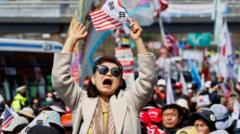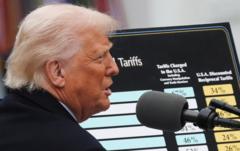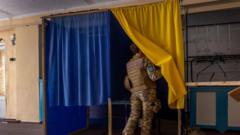The unanimous decision by South Korea's Constitutional Court to remove President Yoon Suk Yeol has left the nation grappling with deep divisions, an urgent need for a new leader, and rising political extremism.
South Korea Faces Uncertainty After President Yoon's Impeachment

South Korea Faces Uncertainty After President Yoon's Impeachment
As the country processes the removal of its president, a turbulent political landscape unfolds.
South Korea is entering a critical phase following the Constitutional Court's dismissal of President Yoon Suk Yeol. The court's ruling, which upholds the impeachment that suspended Yoon's presidency, brings to an end a tumultuous chapter in South Korean politics, marked by an attempted military takeover last December. Citizens gathered across Seoul to witness this significant moment, revealing the intense emotions engulfing both supporters and critics of Yoon.
A snap election must take place by June 3 to choose Yoon's successor. The aftermath of Yoon's six-hour martial law attempt has left an imprint on Korean society, reviving fears of dictatorial governance. While many celebrated the court's ruling as a reinforcement of democracy, the challenges ahead loom large. The court, in its decision, strongly criticized Yoon's actions as a breach of basic political rights and a threat to the rule of law.
Calls for constitutional reforms are growing, aimed at limiting presidential powers to prevent similar authoritarian attempts in the future. However, changing the constitution poses a significant challenge, as future leaders would face the dilemma of relinquishing authority.
Yoon's presidency has polarized the nation further. His refusal to express remorse has transformed him into a symbol for many who view him as a martyr against an alleged corrupt establishment, promoting conspiracy theories that have gained traction. This climate of distrust is evident, with increasing skepticism towards the judicial system and forthcoming elections, which are set against a backdrop of nationwide protests and growing far-right sentiment.
Despite his party's concession, Yoon has not publicly accepted the court's ruling and has expressed regret only toward his supporters. Facing charges of insurrection, Yoon's future remains uncertain as the nation prepares for a leadership transition amid escalating political tensions.
The path ahead is daunting. South Korea must navigate its foreign relations, particularly with the U.S. and North Korea, amidst the economic challenges posed by looming tariffs and potential negotiations with Kim Jong Un. As citizens look toward a new leader, the focus will be on unity and moving beyond the recent turbulence that has fundamentally challenged their democracy.



















